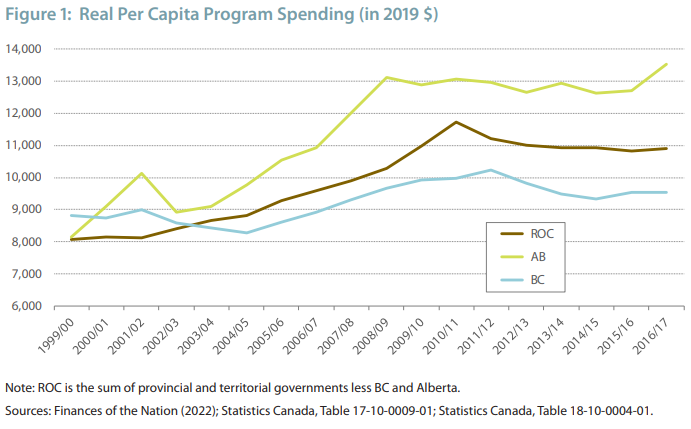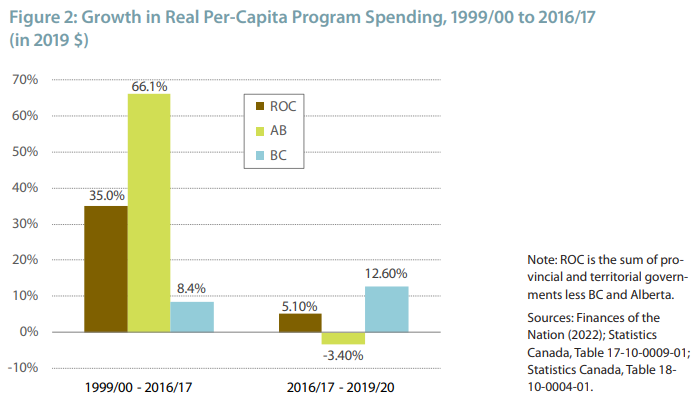B.C. Government Held Fastest Provincial Spending Growth in Canada Before Pandemic
When Covid-19 arrived in Canada in 2020, government spending at the federal and provincial levels increased significantly, to cover the drastic economic downturn.
However, the Fraser Institute has released a new study published Wednesday indicating that the British Columbia government was significantly increasing spending even before Covid-19 existed in the province.
“In 2017, after years of spending restraint and general prosperity in B.C., the government decided to ramp up spending,” said Ben Eisen, a senior fellow at the Fraser Institute and co-author of The End of Spending Restraint in British Columbia.
Coinciding with the election of John Horgan’s New Democratic Party (NDP) government in 2017, the pace of operating spending growth has accelerated.
Source: fraserinstitute.org
The NDP had been in power prior to Horgan from 2000 to 2001 with Premier Ujjal Dosanjh, followed by 17 years of a Liberal government with former Premier’s Gordon Campbell and Christy Clark.
The change in government in 2017 is characterized as an inflection point in B.C.’s fiscal history.
“In just three years before the pandemic, B.C. went from a relatively frugal spender to leading the country in spending growth,” Eisen elaborated in a press release.
2000-2017: The Era of Fiscal Restraint
The years 2000 to 2017 define the province’s most recent period of fiscal restraint. Provincial finances weathered the storm of the 2008/09 recession relatively well and the province’s net debt shrank considerably.
Source: fraserinstitute.org
In the fiscal year 2000, British Columbia’s inflation-adjusted per-person program spending was $8,808. This was 8.2% higher than Alberta’s and 9.2% more than the rest of Canada.
The following graph demonstrates real per-person spending in B.C from 1999/2000 until 2016/2017, which ultimately increased by 8.4%.
Source: fraserinstitute.org
In Alberta, real per-person spending over this same period increased by 66.1% and the remaining provincial and territorial governments increased real per-person spending by 35%.
This era in B.C., defined as a period of fiscal restraint, demonstrates that the province went from having a higher real per capita program spending compared to Alberta and the rest of Canada to having one of the lowest in the nation.
2000-2017: The Era of Fiscal Restraint
From 1999 to 2017, real per capita spending in BC increased by $741 or 8.4%. The year before Horgan’s government’s election, real per-capita spending stood at $9,549.
In 2021/22, B.C. spent (after an adjustment for emergency Covid-19 spending) $12,035 per person. In four years, this represents an increase of 26%, a massive increase in government spending that had not been seen by the three Premiers prior to Horgan.
In fact, the current NDP government’s 2022/23 to 2024/25 budget and fiscal plan shows no signs of slowing down.
The current provincial government is estimating total capital spending to climb over $2.5 billion this year, along with raises in total provincial debt-to-GDP every year, for a total of a 5% increase by 2024/25.
The report indicated the following:
“Over a five-year period the Horgan government has increased spending by about three times as much as that which occurred during the 17-year period of spending restraint from fiscal year 2000 to 2017.”
Some spending can be attributed to the Covid-19 pandemic, but the federal government helped shoulder a substantial amount of that cost, as it did with other provinces.
A Decline In Net Debt-to-GDP In Other Provinces
This year, B.C. is forecasting its net debt-to-GDP ratio to climb to 15.6%, an increase of 1.3% over the last six years.
From 2016/17 to 2022/23, Ontario projects that its debt-to-GDP ratio will decrease by 1.3%. Again, Quebec’s debt-to-GDP ratio is set to decline by 12% over the same period.
The trend is worrisome for British Columbians, as it places the province at a higher level of economic risk. A higher percentage of debt-to-GDP hinders the province’s ability to pay back that debt and ultimately can lead to slower economic growth.
With Premier David Eby now at the helm of the NDP government, we have yet to experience a substantial move to reign in responsible fiscal policies, something not seen since Christy Clark and the B.C. Liberal Party.





